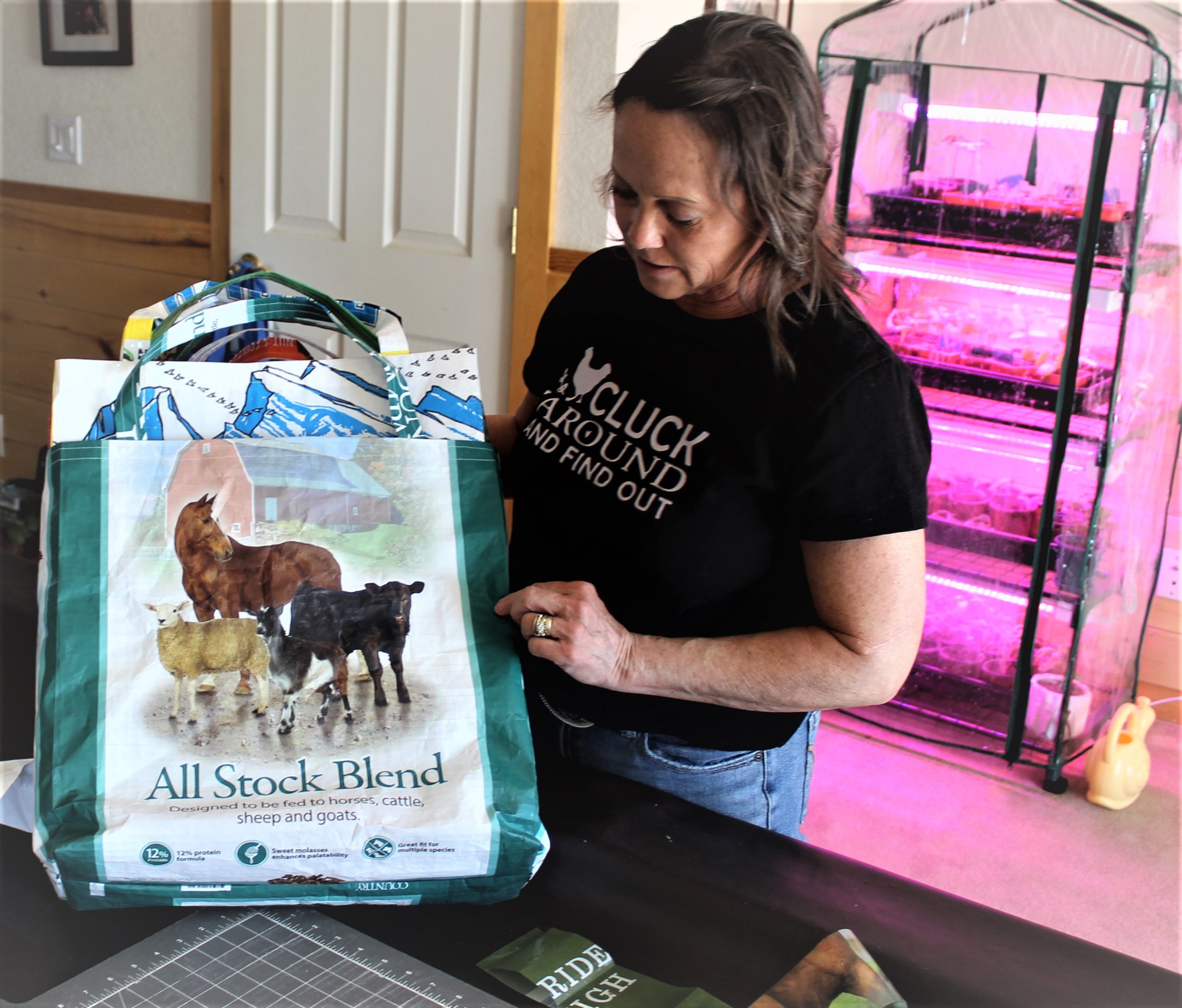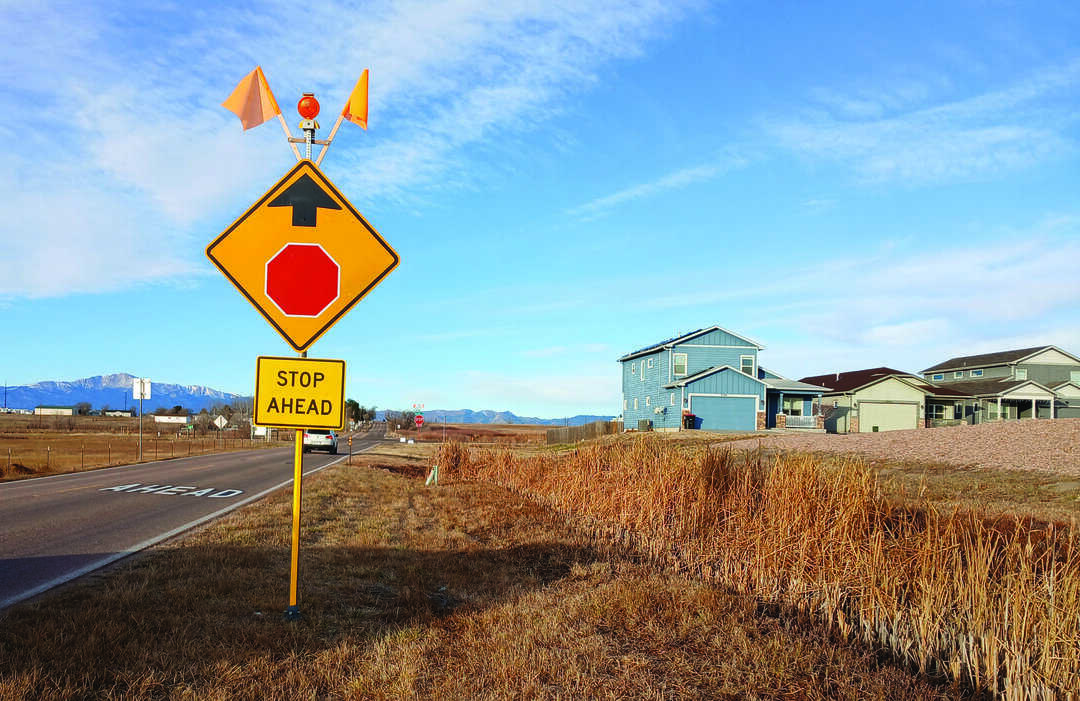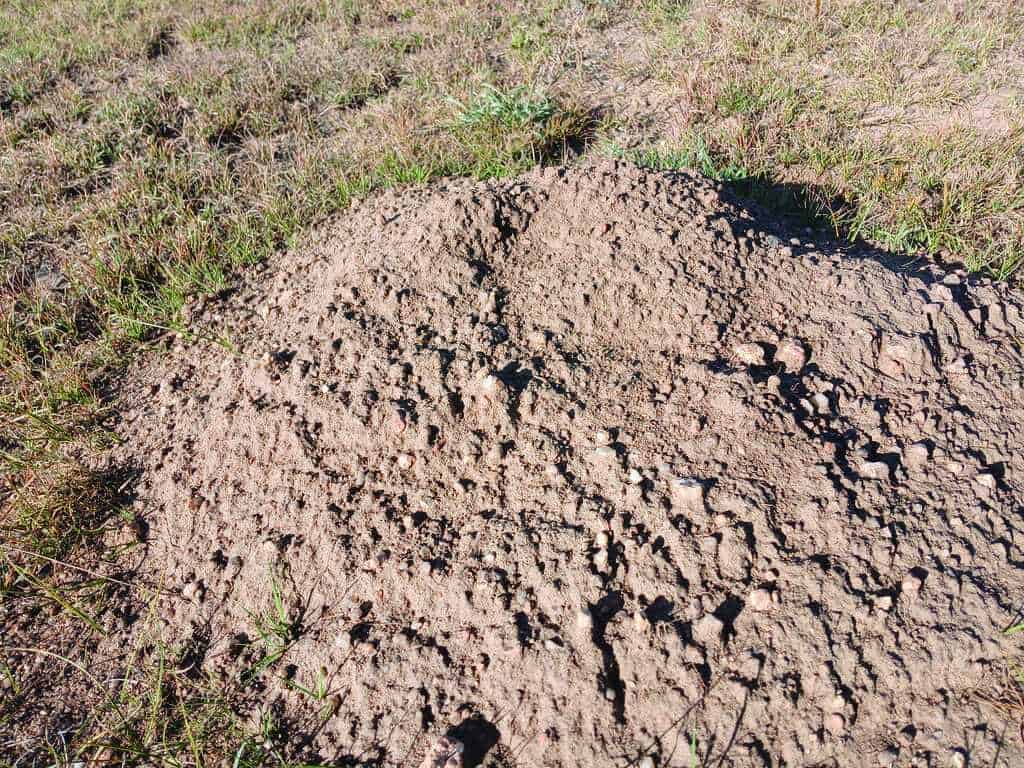A farm and a few side hustles
By Bill Radford
Horse feed. Goat feed. Chicken feed. Rabbit feed.
Our empty grain bags add up quickly. But now at least some of them have a second life, transformed into grocery bags as Colorado says farewell to plastic bags.
That transformation is courtesy of Linda Botkin of Botkin Farms in Falcon, whose many side hustles include her bag business.
She is not the only one who has embraced the idea. You can find multiple YouTube videos on how to make shopping bags out of feed bags, along with Pinterest pages devoted to the topic. And I’ve found at least a couple of other area folks on Facebook touting their bags for sale.
For Botkin, the idea came last summer.
“My sisters and a friend were here visiting and we were all horseback riding, and I was thinking of making something for them to take back with them to Iowa. I got online and Googled on what you can do with feed bags and came across a pattern and made some bags for them. My friend said, ‘You know, you could sell these.’”
She typically sells her bags for $10. That’s certainly more than, say, a reusable bag you can buy at Walmart. But her bags are larger and sturdier — and a conversation starter. (She was tickled when she was at a store and heard a customer comment on another woman’s “cute animal bag” — one that Botkin had made.)
Botkin also makes and sells T-shirts and “fun can koozies.” She has been sewing since she was in the seventh grade, taking after her mom, who also sewed. “I used to sew a lot of my kids’ clothes,” she says.
Sewing the feed bags is a special challenge since she is dealing with plastic, not fabric. “The biggest obstacle,” she says, “is getting the thread tension right. … There is an adjustment you have to make depending on the type of bag you’re sewing.”
Botkin and her husband, then empty-nesters, moved from the north end of Colorado Springs to Falcon five years ago; she was tired of having to pay to board her horse and wanted a permanent home for it. “I grew up on a farm in the Midwest, so it just felt natural for me to come back to it,” she says.
It’s hard to believe she has much time to spend at the sewing machine. Botkin also works full time at Integrity Bank & Trust in Colorado Springs, and she and her husband, a master electrician, are also raising a 4-year-old granddaughter. There are three horses to care for and chickens. (There used to be pigs, too. But after her sow gave birth to 14 babies, Botkin had to step in and bottle-feed the piglets every two hours for the first few days; that ordeal got her out of the pig-breeding business.)
And, again, the bags are just one of Botkin’s side hustles. With those chickens, she also has a busy egg business. She has 80-plus chickens, although about three-dozen are still chicks and thus not of egg-laying age. At the opposite end of the spectrum, she has some older hens that are past laying age and she simply lets them retire vs. ending up on the dinner table — although she does also raise chickens for meat. She ends up with more than two-dozen eggs a day. Those eggs first go to a loyal established customer base, then she works to satisfy as many new customers as she can.
Unlike our chickens, which largely shut down egg production in the winter, her hens keep laying through all seasons. “I specifically choose my breeds for their laying, the number of eggs they lay,” she says. “The white leghorns are very prolific egg layers and go all year-round.” Unlike some people, though, she doesn’t use artificial light to stimulate egg production during the short winter days: “I let Mother Nature do her thing.”
The summer months also find her in the large garden her husband built her; she sells vegetables in the summertime. She grows sweet corn, tomatoes, green beans, peas and more.
“Pumpkins do really good out here,” Botkin notes. “My husband is a beer brewer and we like to make a pumpkin beer, so I grow pumpkins just for beer. And I also grow jack-o’-lantern pumpkins; I sold a lot of those last year.”
I wondered about her secret to gardening, since our garden is always a struggle.
A good garden soil is key, she says. She also starts many of her plants inside before exposing them to the elements. “The sun is a killer,” she says, so she uses a shade cloth to protect her tomatoes and strawberries. “Everything else is pretty much on its own.”
She also benefits from not having the clouds of grasshoppers descend on her garden as they do ours. The grasshoppers she encounters are a small enough number that she can simply pick them off the plants and feed them to her chickens.
So, a full-time job. Sewing. Gardening. Selling eggs. Why take on so much?
“Feeding horses isn’t cheap; I’m always looking for extra money to help pay for hay. The chickens pretty much pay for themselves.”
And, besides, she says in what seems to be a bit of an understatement, “I’m just that kind of person who’s always got to be busy.”
(To buy or learn more about Botkin’s feed-bag shopping bags, look for her on Facebook or call 719-640-4159. You might also find her at the twice-a-month Critter Swap at Big R in Falcon.)

Caption: Linda Botkin is with some of the shopping bags she has made from feed bags. Behind her are plants that she starts indoors before moving them to her garden. Photo by Bill Radford
Pull quote: Sewing the feed bags is a special challenge since Botkin is dealing with plastic, not fabric. “The biggest obstacle,” she says, “is getting the thread tension right. … There is an adjustment you have to make depending on the type of bag you’re sewing.”
Linda Botkin





